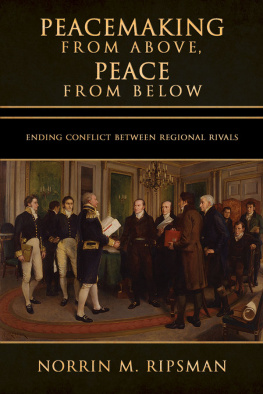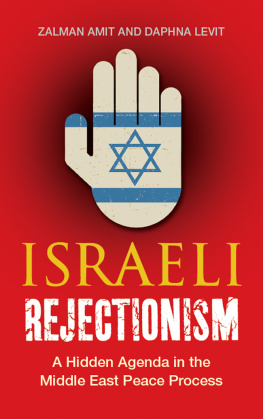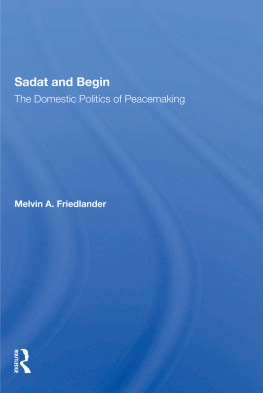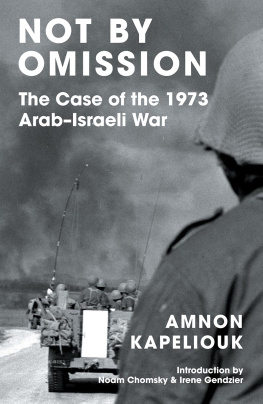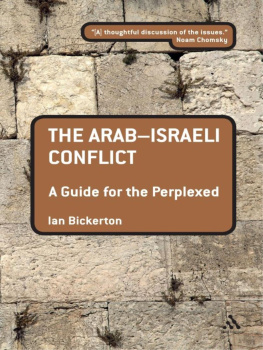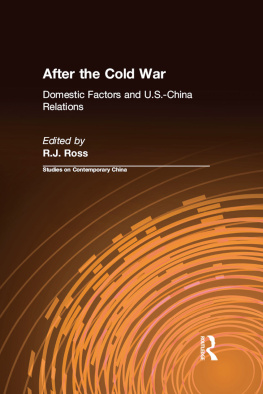Israeli Peacemaking Since 1967
Examining the IsraeliArab conflict as an intractable conflict, Israeli Peacemaking Since 1967 seeks to determine just which factors, or combination of factors, impacted upon Israels positions in past peacemaking efforts, possibly accounting for breakthroughs or failures to reach agreement.
From the rejection of King Husseins little known overtures immediately after the Six-Day War, through President Sadats futile efforts to avoid war in the early 1970s, to repeated third-party mediated talks with Syria, factors including deep-seated mistrust, leadership style, and domestic political spoilers contributed to failures even as public opinion and international circumstances may have been favorable. How these and other factors intervened, changed, or were handled, allowing for the few breakthroughs (with Egypt and Jordan) or the near breakthrough of the Annapolis process with the Palestinians, provides not only an understanding of the past but possible keys for future IsraeliArab peace efforts.
Employing extensive use of archival material, as well as interviews and thorough research of available sources, this book provides insight on just which factors, or combination of factors, account for the few successful but far more numerous failed efforts to resolve the conflict a framework useful for examining the IsraeliArab conflict today and intractable conflicts in general.
Galia Golan is a leading Israeli political scientist, Darwin Professor of Soviet and East European Studies Emerita, formerly head of the Political Science Department at the Hebrew University, Jerusalem, currently Head of the M.A. and Conflict Resolution Programs at the Interdisciplinary Center, Herzliya (IDC), and the author of ten books, many of which address the ArabIsraeli conflict. She has also co-edited a volume with Walid Salem, Non-State Actors in the Middle East: Factors for Peace and Democracy (Routledge, 2013).
UCLA Center for Middle East Development (CMED)
Series Editors
Steven Spiegel, UCLA
Elizabeth Matthews, California State University, San Marcos
The UCLA Center for Middle East Development (CMED) series on Middle East security and cooperation is designed to present a variety of perspectives on a specific topic, such as democracy in the Middle East, dynamics of IsraeliPalestinian relations, Gulf security, and the gender factor in the Middle East. The uniqueness of the series is that the authors write from the viewpoint of a variety of countries so that no matter what the issue, articles appear from many different states, both within and beyond the region. No existing series provides a comparable multinational collection of authors in each volume. Thus, the series presents a combination of writers from countries who, for political reasons, do not always publish in the same volume. The series features a number of sub-themes under a single heading, covering security, social, political, and economic factors affecting the Middle East.
1 The Struggle over Democracy in the Middle East
Regional Politics and External Policies
Edited by Nathan J. Brown and Emad El-Din Shahin
2 Women in the Middle East and North Africa
Agents of Change
Edited by Fatima Sadiqi and Moha Ennaji
3 The Israel-Palestine Conflict
Parallel Discourses
Edited by Elizabeth Matthews
4 Gender and Violence in the Middle East
Edited by Moha Ennaji and Fatima Sadiqi
5 Non-State Actors in the Middle East
Factors for Peace and Democracy
Galia Golan and Walid Salem
6 Regional Security Dialogue in the Middle East
Changes, Challenges and Opportunities
Edited by Chen Kane and Egle Murauskaite
7 Israeli Peacemaking Since 1967
Factors Behind the Breakthroughs and Failure
Galia Golan
Israeli Peacemaking Since 1967
Factors Behind the Breakthroughs and Failures
Galia Golan
First published 2015
by Routledge
2 Park Square, Milton Park, Abingdon, Oxon OX14 4RN
and by Routledge
711 Third Avenue, New York, NY 10017
Routledge is an imprint of the Taylor & Francis Group, an informa business
2015 Galia Golan
The right of Galia Golan to be identified as author of this work has been asserted by her in accordance with sections 77 and 78 of the Copyright, Designs and Patents Act 1988.
All rights reserved. No part of this book may be reprinted or reproduced or utilised in any form or by any electronic, mechanical, or other means, now known or hereafter invented, including photocopying and recording, or in any information storage or retrieval system, without permission in writing from the publishers.
Trademark notice: Product or corporate names may be trademarks or registered trademarks, and are used only for identification and explanation without intent to infringe.
British Library Cataloguing in Publication Data
A catalogue record for this book is available from the British Library
Library of Congress Cataloging in Publication Data
Golan, Galia.
Israeli peacemaking since 1967 : factors behind the breakthroughs and failures / Galia Golan.
pages cm. -- (UCLA Center for Middle East development series)
Includes bibliographical references and index.
1. Arab-Israeli conflict--Diplomatic history. 2. Arab-Israeli conflict--Peace.
I. Title.
DS119.7.G617 2014
327.56940174927--dc23
2014002663
ISBN: 978-1-138-78434-5 (hbk)
ISBN: 978-1-138-78435-2 (pbk)
ISBN: 978-1-315-76622-5 (ebk)
Typeset in Times New Roman
by Taylor & Francis Books
To my grandchildren, in the hope that they will soon see the advent of a final breakthrough to peace.
Contents
Preface
Curiosity is as good a reason as any to write a book. And, indeed, that was the reason for most of the books I have written, as distinct from the posing of an hypothesis to be proven or disproven. In the case of the present book, my curiosity was sparked by two events actually, people. The first was a graduate student and friend, Itay Mizrav, who told me of a fascinating M.A. seminar he was taking with Professor Eli Podeh on Missed Opportunities in the ArabIsraeli conflict. The second was a passing comment by Professor Zaki Shalom at a conference abroad to the effect that King Hussein had made a peace offer to Israel in the summer of 1967. The latter revelation actually angered me since I remembered hastening to see the Occupied Territories (especially Bethlehem, Jericho, etc.) immediately after the 1967 war since at the time we fully expected that Israel would be returning the territories, in exchange for peace. Moshe Dayan, then minister of defense, had actually said the government was waiting for a phone call a comment made more cynically, I now know, than sincerely at the time. There were, of course, those who knew about the Jordanian initiative, but the general public and even many of my academic colleagues were not aware of this. So, my curiosity having been sparked by these two comments, I began researching past Israeli negotiations with the purpose not only of finding out what had transpired, but, more importantly for me, why if peace had been offered, or perhaps been possible, at various times since 1967, why were we still struggling with the conflict? Thus, my interest was to try to determine just what accounted for and perhaps still accounts for the failure to reach peace or, conversely, the few successes that did occur. More specifically, I was interested in understanding what motivated or shaped Israeli positions at each (potential) cross-road. This has not been of merely academic interest to me, though I believe my findings will be of some academic value. Rather, it has been important to me personally, as an Israeli, to understand what lay behind the contribution or lack of contribution of my own government to the breakthroughs or failures in the attempts at resolution of the conflict over the years. This is of particular importance to me and many other Israelis who believe that resolution of the conflict is essential to the well-being and future of Israel no less than it is to that of the Palestinians or our other neighbors. It is my hope that identifying, to the extent possible, those factors that affected past efforts at peacemaking can inform and improve future efforts.




